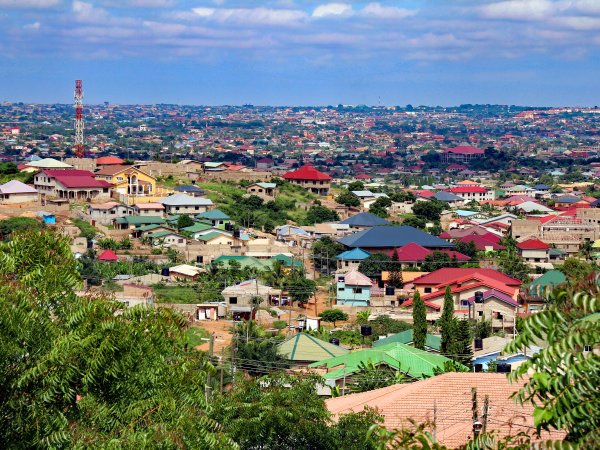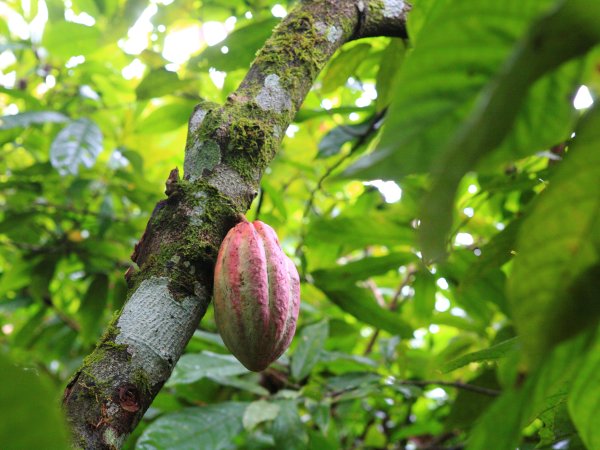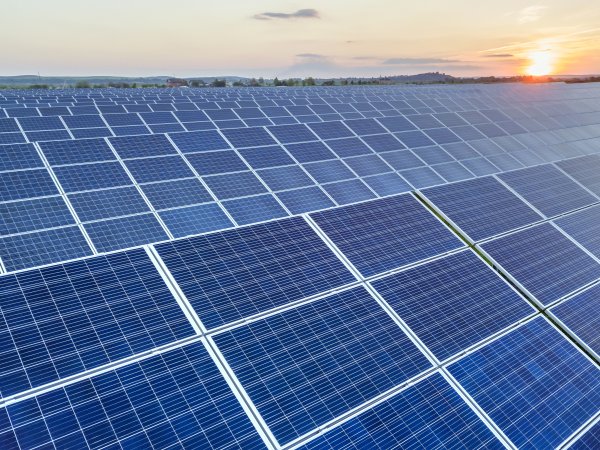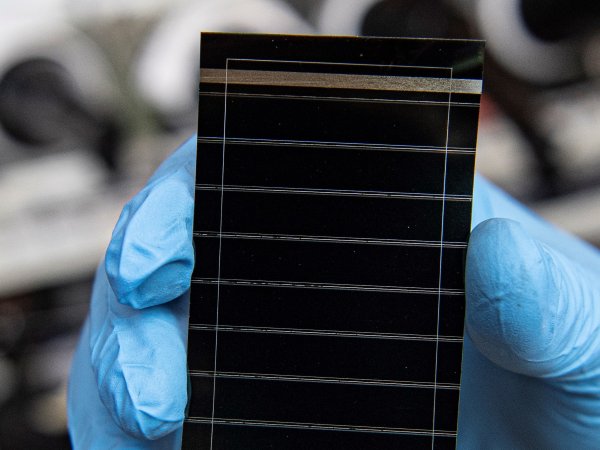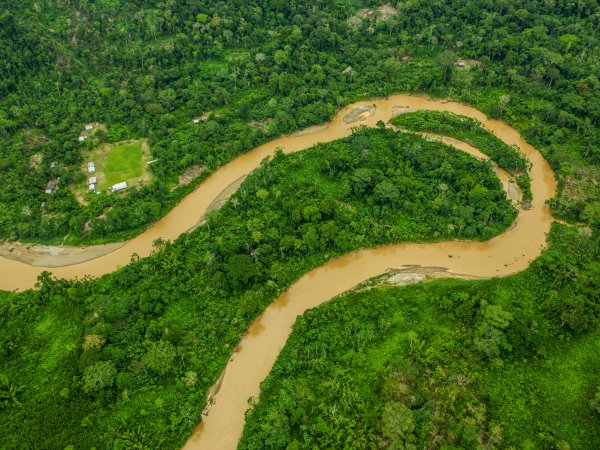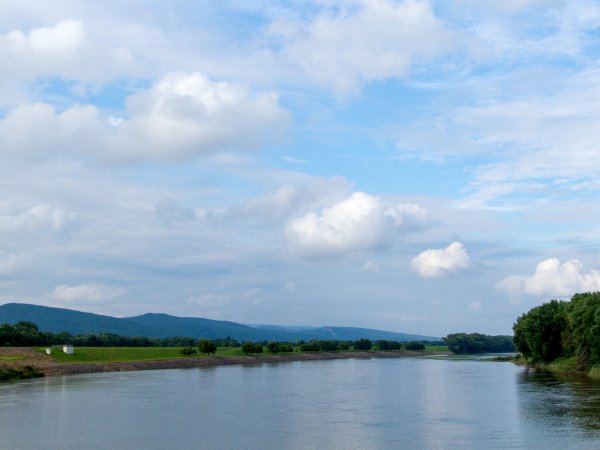For the 2024 Seed Grant Program, 32+ researchers from the following 8 colleges and 2 campuses were awarded funding for 11 collaborative research projects aligned with IEE's 5 research themes:
- College of Agricultural Sciences
- College of Arts and Architecture
- College of Earth and Mineral Sciences
- College of Engineering
- College of Information Sciences and Technology
- College of Medicine
- Donald P. Bellisario College of Communications
- Eberly College of Science
- Penn State Behrend
- Penn State University Park

Funded Projects
The following 11 projects were awarded seed grant funding in the 2024 IEE Seed Grant Program.
A Spatiotemporal Analysis of Community Power Outage Impact under Extreme Weather
This research is studying how power outages affect homes and people during extreme weather, considering factors like building types, resident demographics, and resident behaviors, to help communities prepare better.
Assessing Front-Line Health Workers’ and Community Members’ Awareness of the Link between Climate Change and Ebola Virus Disease in Ghana
A research team is studying how climate change affects Ebola spread in Ghana and assessing healthcare workers' and community members' knowledge and attitudes to improve preparedness and prevention strategies.
Climate-Smart Agroforestry: Unraveling Ecological Interactions for Enhanced Vector-Borne Disease Surveillance and Prediction in Tropical Regions
By using portable technology to identify pathogens in ticks, this research project is studying how shade-grown cacao farms in Belize might affect the spread of diseases between animals and people.
Developing Nonreciprocal Thermal Emitters for Renewable Energy Harvesting
This research project is developing special materials that emit heat in one direction but not absorb heat in the same direction, which could improve the efficiency of solar cells and other renewable energy technologies.
Development and Social Implications of CO2-Negative Bioproducts Derived from Crop Residues for On-Site Energy and Decarbonized Cement Production
This project aims to turn farm waste into a CO2-absorbing material for cement production, helping farmers while addressing climate change.
Equitable Optimization of Transportation Systems and Services to Address Climate and Sustainability Challenges
This interdisciplinary research project leverages artificial intelligence (AI) to optimize transportation networks and services, aiming to achieve significant reductions in energy consumption and pollution within urban environments.
Expectations vs. Achievements: Building Energy Use in Planning and Operation
This research team is investigating why actual energy use in homes can be much higher or lower than what is predicted by computer models, aiming to improve the accuracy of building energy predictions.
Heat Waves, Household Adaption, and Infant Health in California
This project investigates how heat waves harm pregnant women and newborns, especially in poorer communities with less air conditioning, aiming to inform policies that reduce these health disparities.
Integrating c-AFM Characterization with Machine Learning Techniques to Decipher MAPbI3 Instability in Perovskite Solar Cells
Scientists are using a powerful microscope and computer analysis to investigate why perovskite solar cells lose efficiency over time.
Protecting the Amazon Rainforest from Oil Exploitation: Combining Indigenous Body-Territory Epistemology with Environmental Monitoring to Empower Local Conservation Efforts
This research team will work with Indigenous people in the Amazon rainforest to combine their knowledge of the land with science to create a detailed map showing how oil extraction has polluted the water and soil.
Visualizing Inland Flood Hazard in the Face of Climate Change
A research team is creating realistic 3D flood visualizations to better show communities the dangers of future flooding and failing levees due to climate change.
RFP
The Institute of Energy and the Environment's Seed Grant Program is intended to foster basic and applied research on strategic interdisciplinary topics that leverage faculty expertise across the University. The Seed Grant Program strives to:
- Develop new interdisciplinary research teams and position them for high-impact research and substantial external funding success
- Pursue novel research in IEE’s theme areas, especially high-risk proof of concept projects
- Promote research development and mentorship between junior and senior faculty
Quick Links
Climate Requirement
This year, IEE requires that all proposals (1) have a climate-related theme and (2) address one of IEE's five research themes.
To address climate and these themes, proposal topics might be on: climate and water, climate and health, climate solutions using renewable energy for avoiding greenhouse gas emissions, or any topic that fits completely within climate and ecosystem change.
In addition to addressing these themes, IEE is also interested in proposals that address climate change solutions based on understanding or motivating changes in social behavior. IEE will be working with the Social Science Research Institute to encourage new collaborations that bring together social and physical scientists or engineers to work together on climate solutions.
Important Dates
| Date | Event |
|---|---|
| September 26, 2023, 12:30pm | 2024 IEE Seed Grant Webinar |
| November 29, 2023, 5pm (EST) | Proposal Submission Deadline |
| March 2024 | Funding Decisions Announced |
| July 2024 | Grant funds made available and must be expended by June 30, 2025 |
| July 31, 2025 | Final report due |
Program Guidelines
Eligibility
All Penn State faculty members (tenured, tenure-track, and fixed-term) who hold an appointment of half-time or more at any Penn State campus are eligible to submit a seed grant proposal as a Principal Investigator (PI). Researchers, students, and staff from Penn State, other research institutions, Pennsylvania state agencies, federal agencies, and private industry may be included as collaborators in seed grant proposals, but subcontracts to entities outside of Penn State are not allowed. Please note that while most proposals are expected to include multiple investigators, there can only be one responsible PI and two additional investigators for each application (maximum of three investigators). In addition, investigators may only serve as PI on a single proposal.
New teams of investigators will be given preference over those who may have previously received an IEE seed grant. PIs awarded an IEE Seed Grant in 2023 are ineligible to serve as PI for this call but may participate as a co-PI or member of the project team on a submission. Recipients of funding must be willing to participate as a reviewer for future seed grant proposals.
Funding Availability
To encourage the establishment of new collaborations and enhancement of networks, larger grants will require innovative partnerships of investigators from multiple colleges and/or campus locations. Funds up to $40,000 are available for multi-college/school (across University Park) and multi-campus (between campuses) collaborative grants. For 2024, projects that have two or more faculty with different disciplinary expertise, that are housed within the same college (University Park) or at a single Commonwealth Campus, will also be eligible for funding at the full amount but will be given a lower priority than those from multi-colleges.
Funds may be used to support research development and coordination expenses such as:
- Graduate student stipends
- Graduate student tuition (GIA) support
- Undergraduate student wages
- Postdoctoral funding
- Instrumentation fees and sample analysis to collect preliminary data
- Equipment, supplies, and participant payments
- Travel associated with conducting/reporting seed grant research (Penn State participants only)
- Hosting a research planning meeting for an interdisciplinary team
- Planning and hosting conferences and symposia
- Funding for data conversion technology and wages to support date conversion
The budget should span only the next fiscal year (FY25), or from the period July 1, 2024 to June 30, 2025. Unspent funds will not carry forward to the next fiscal year.
The following funding restrictions apply:
- Regular appointment, summer, or supplemental salary support for faculty is disallowed
- Postdocs may not be the PI
- Travel support to attend conferences is disallowed
Submission Instructions
All proposals must be submitted electronically via upload at https://psu.infoready4.com/#competitionDetail/1915332 no later than 5 p.m. (EST) on November 29, 2023. Each proposal is limited to a 2-page project description, a page for the abstract, and additional pages for an appendix.
Note: There is no preproposal stage, so the two-page project description needs to clearly address all the review criteria. Also, note that you are the expert in your field, so help the interdisciplinary team of reviewers understand the relevance of this proposed research.
Proposal Format
- Size 12 font
- Left aligned with 1-inch margins
- PDF document saved as PI_Last Name_2024_IEESeedGrant (e.g. Smith_2024_IEESeedGrant.pdf)
Abstract
- Project abstract (understandable by an interdisciplinary audience limited to 500-words (no graphics)
Project Description. Limited to two pages and must include:
- Title of project
- PI and co-PI's names, including college, department and/or campus (no more than 3)
- Short description of how this project will leverage seed funding (graphics allowed)
- Nature of collaboration (new/existing; mentorship opportunities)
- Total funding to be requested, including brief budget justification
The appendix shall include:
- A list of all collaborators, their colleges and/or departments
- One-page or two-page resumes for the PI and all co-PIs
- References/citations may be included in the appendix
Review Criteria
Proposal reviews are based on the criteria listed below. Importantly, please keep in mind that these proposals are reviewed by a cross-section of researchers with different backgrounds; your ability to communicate your ideas to a broader audience is important for success with interdisciplinary project review panels. Please also consider in your proposal the information that will be requested in a report at the conclusion of your seed grant. The final report can be downloaded from InfoReady. This report emphasizes addressing a key point that will enable you to obtain extramural funding to fully support your collaborative research. The goal of the project is not to complete a project or publish a paper.
Intellectual Merit (40%)
- Creativity and innovation of the proposal: how does this project advance our understanding of the issue?
- Significance of goals and results: why does this project matter?
- Soundness of research plan. What is the research plan for this project? Is the proposed project in line with the budget that can be provided by a seed grant?
Collaborative Potential (30%)
- Interdisciplinary focus: does this proposal include researchers from different disciplines and perspectives? Is it clear how each person will contribute to this project?
- What is the potential for developing new and productive collaborations between PIs? Is there consideration given to mentorship and collaborations between junior and senior faculty?
- Does the proposal contain collaborations across colleges?
Potential for Impact (30%)
- Positive impact in the intended field: how might this proposal lead to exceptional scholarship or broader impacts on society? Impact can include both technical advances in a field as well as impacts on communities, governance, or society at large, including human health.
- Potential for external funding: is there a credible and clearly articulated strategy for leveraging this seed grant investment into external funding?
- Potential for additional/continued activity beyond the seed grant phase may include plans for continued activity such as applications for external support from federal, state or local government agencies, industry, private foundations; plans for continued research activities involving in-kind support, teaching activities, on-going scholarly work; plans for public engagement and outreach; and expanded implementation by external stakeholders.
- Providing specific examples, including specifics of external funding opportunities, or contact with program officers has been helpful in establishing the credibility of these strategies to prior seed grant reviewers.
Scoring by Reviewers
Reviewers will score each of these categories on a scale from 1-5 and will provide an overall ranking of highly recommend, recommend, or not recommend.
5 = Excellent for all criteria in this category
4 = Very good response to the criteria in this category
3 = Good response to the criteria in this category
2 = Fair response to the criteria in this category but more information needed
1 = Limited information provided for this category
Proposals will be reviewed on the following weighted basis: 40% Intellectual Merit, 30% Collaborative Potential, and 30% Potential for Impact.
A separate and final overall score will also be assigned on the ranking of 1-3.
Please direct any questions regarding the proposal process to iee@psu.edu.
IEE Research Themes
The five IEE research themes are summarized below. These themes reflect IEE’s current strategic priorities.
Climate and Ecosystem Change
Managing the risks of anthropogenic climate change poses significant challenges now and into the future. Warmer and more extreme weather events will increase the risk of natural disturbances, increase the burden of pests and pathogens, threaten public health and biodiversity, and expose vulnerabilities in critical infrastructural systems. The burden of climate resilience and adaptation will fall unequally and inequitably, burdening people of color and rural and poor communities disproportionately. IEE’s commitment to supporting interdisciplinary research in energy and the environment means we have a unique opportunity to identify solutions to these impacts across natural, social, and built systems. Building on Penn State’s distinctive foundation in climate change research, we seek new and innovative advances in the following areas:
- Climate science: including but not limited to climate or ecosystem modeling, ecological forecasting, data visualization, and ecosystem or human impacts.
- Climate risk: including but not limited to natural hazards, adaptation, decision-making, and social and ecological resilience.
- Climate solutions: including but not limited to justice, health, policy, nature-based solutions, climate-smart technology, infrastructure, and ecosystem management.
In addition to climate-focused work, Penn State is focused on ecosystem change more broadly and welcomes proposals in this area, including resilience and adaptation to change, provision of ecosystem-related goods and services, connections, and feedbacks across ecological systems (including natural and human ecology), rapid evolutionary change (including impacts to biodiversity), and ecological foundations. For more, see the Ecology Institute. We welcome projects that leverage Penn State’s existing resources such as the Shale Hills Critical Zone Observatory.
Health and the Environment
The National Academy of Sciences, Engineering, and Medicine (NASEM) has an “Environmental Health Matters Initiative” to “enhance the nation’s ability to alleviate harmful environmental impacts on human health.” The initiative is sponsored by major government funders as well as the private sector. We particularly welcome proposals that respond to this initiative. In addition, Penn State has major strengths in exposure assessment and monitoring both historic and predictive, which are of value during times of environmental change and disruption. Linking these historic established strengths to health outcomes is an underused opportunity. Penn State's Clinical and Translational Research Institute has access to large, structured databases; Penn State clinical investigators can establish panel studies of vulnerable populations, in many settings—urban, rural, and globally. Biobehavioral health and health and human development are also subject to environmental impacts. Furthermore, the linkage between gene- environment interactions provide an additional window into vulnerabilities. Measuring the health benefits of environmental remediation strategies is another area of research need that requires interdisciplinary teams. Expanding and leveraging this knowledge can enhance health in a myriad of different ways and address current and future environmental challenges. Areas of focus include but are not limited to the following:
- Climate change and health, including both health impacts and solutions
- Impacts of air pollution, including topics such as improving exposure monitoring in vulnerable communities and how it impacts the severity of COVID-19
- Energy and health policy (including health drivers of energy choices as well as energy- related drivers of health outcomes)
- Water and health, including aquatic toxicology, microplastics, and more Health and the built environment
- Health, the environment, and environmental equity/justice considerations
Integrated Energy Systems
Improvements in energy efficiency, infrastructure stability, and a reduction in carbon emissions require changes in existing and planned technologies. Legal and policy frameworks that encourage, rather than thwart, the adoption of appropriate technological solutions is also needed. We are looking for ways to develop, advance, and disseminate innovative methods for all aspects of energy: production, infrastructure, utilization, engineered and natural carbon sequestration, energy storage and management, related environmental questions, energy efficiency of buildings, transportation, businesses, and other modes of consumption. Research to develop policy foundations supporting next-generation energy systems is an integral part of this theme and will be considered for co-funding by the Penn State Center for Energy Law and Policy. At a time of rapid energy system transformation, these components will form the basis of the next generation of integrated energy systems to deliver clean, safe, abundant, affordable, and reliable energy as a foundation for economic and human development. In addition to this broad theme, we are particularly interested in projects that focus on the following:
- Negative carbon emissions (including the technical, biophysical, and socio-political opportunities and challenges associated with natural and technical solutions that generate negative emissions)
- Renewable energy technologies
- Resilience of energy systems in response to stressors, particularly (but not limited to) extreme weather events and cyber-stressors
- Legal and regulatory frameworks that incorporate governance or equity issues, or that can drive down non-hardware costs of low-carbon energy technologies
- Science-based legal and regulatory frameworks for emerging energy systems (e.g. microgrids, hydrogen, coupled systems, advanced nuclear, wireless electricity, etc.)
- Energy consumption behaviors and implications for policy design
- Optimization for the planning and operations of integrated, low-carbon, and smart energy systems
Urban Systems
Anthropogenic and environmental changes are profoundly impacting the health and sustainability of humans and the environment. Across the globe, the trend toward urbanization is driving resource needs and impacts with water, food, and energy while disparately impacting low-income/minority populations. This theme is meant to catalyze research partnerships related to urban systems, including the urban/rural interface, buildings, transportation, and more. As a new theme, we welcome ideas or ways to catalyze inter-disciplinary work in this space and recommend looking at the National Science Foundation’s information on Communities in the 21st Century for background. Potential ideas include the following:
- Health and human performance impacts of indoor and outdoor urban environments
- Finance and policy for net zero/carbon neutral building energy efficiency
- Innovative, low-carbon materials and technologies for high-performance buildings
- Understanding and accelerating the transformation of energy systems, urban systems, and environmental systems for sustainability
Water and Biogeochemical Cycles
Water is foundational to the health, safety, and standard of living of people, the condition and productivity of ecosystems, the vibrancy of communities and economies, and the stability of nations. Despite its importance, we continue to struggle across Pennsylvania, the nation, and globally to achieve many water-dependent social objectives, and disproportionately so in communities of color and otherwise under-represented communities.
We seek innovative research that advances understanding and demonstrates equitable solutions for addressing water-related challenges, with priority given to proposals focused on:
- Protecting public health and the environment through advancing our understanding of human and ecological health, ecosystem services, sustainable economies, and the development of novel solutions to enduring water quality problems as well as emerging contaminants of concern.
- Advancing resilient communities through strengthening our understanding of fundamental Earth processes across scales with a focus on disruptive events relative to the hydrosphere and developing innovations that enhance water infrastructure resilience through actionable climate solutions.
- Driving innovation and technology in the water sector through the development of next-generation tools, techniques, materials, and processes, and advancing data-driven solutions.
- Guiding social action, policy, and corporate transformation through projects that can strengthen public governance, water ethics, environmental justice, and improved private sector performance, while achieving water challenges with culturally appropriate solutions.
In addition to natural science and engineering proposals, we encourage proposals that focus on or encompass elements of policy, law, ethics, social justice, economics, finance and actuarial science, and other social sciences.
Review Committee
- Charles Anderson, Climate and Ecosystem Change
- Greg Barber, Integrated Energy Systems
- Rebecca Bascom, Health and the Environment
- Seth Blumsack, Integrated Energy Systems
- Kathryn Brasier, Climate and Ecosystem Change
- Seyedehaida Ebrahimi, Health and the Environment
- Enrique Gomez, Integrated Energy Systems
- Christopher Gorski, Urban Systems
- Corey Gracie-Griffin, Urban Systems
- Sibel Irmak, Integrated Energy Systems
- Michael Janik, Integrated Energy Systems
- Athanasios Karamalidis, Integrated Energy Systems
- Benjamin Lear, Integrated Energy Systems
- Bruce Logan, All themes
- Yashar Mehmani, Integrated Energy Systems
- Alfonso Mejia, Climate and Ecosystem Change
- Anne Menefee, Integrated Energy Systems
- James Mutunga, Integrated Energy Systems
- Esther Obonyo, Urban Systems
- Emily Pakhtigian, Health and the Environment
- Gary Perdew, Health and the Environment
- Joyce Sakamoto, Health and the Environment
- Howard Salis, Integrated Energy Systems
- Erica Smithwick, Climate and Ecosystem Change
- Donghai Wang, Integrated Energy Systems
- Andrew Warner, Water and Biogeochemical Cycles
- Sarah Whitney, Climate and Ecosystem Change


